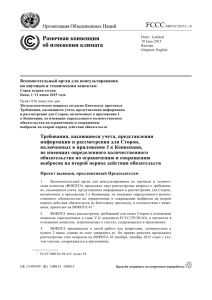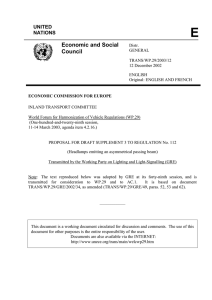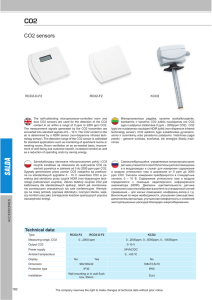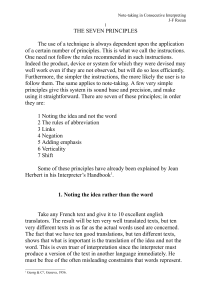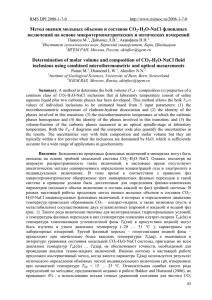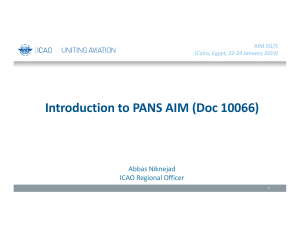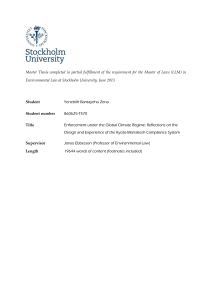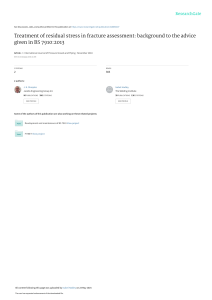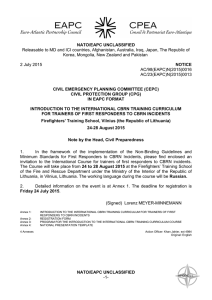Рассмотрение информации о потенциальных
advertisement
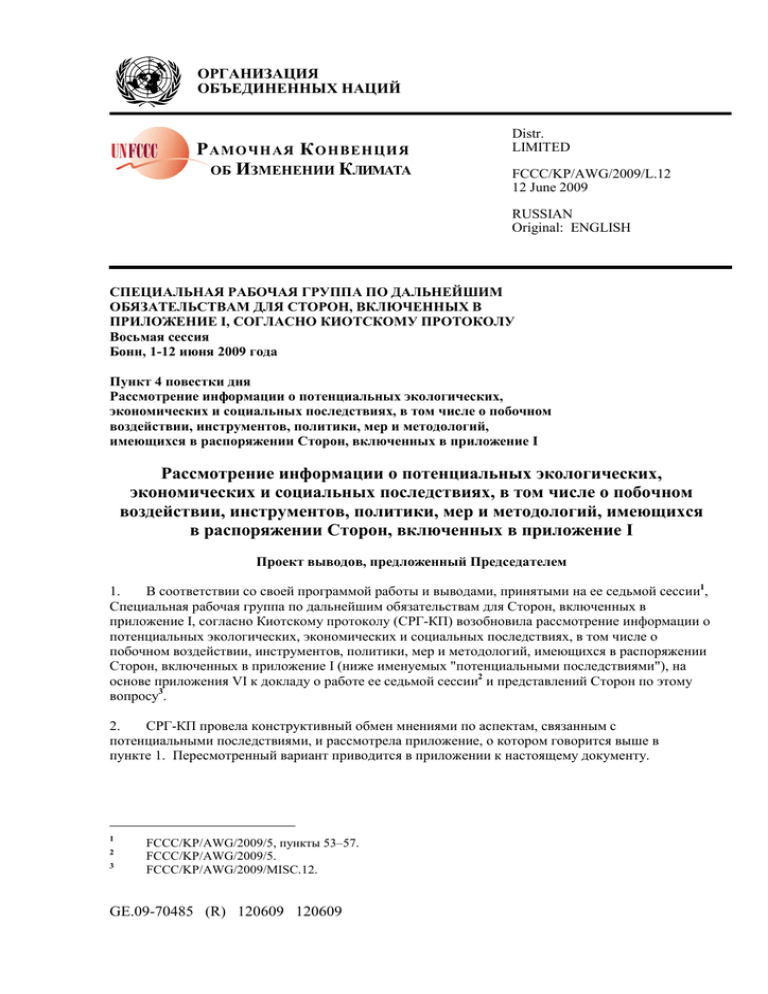
ОРГАНИЗАЦИЯ
ОБЪЕДИНЕННЫХ НАЦИЙ
Р АМОЧНАЯ К ОНВЕНЦИЯ
ОБ ИЗМЕНЕНИИ КЛИМАТА
Distr.
LIMITED
FCCC/KP/AWG/2009/L.12
12 June 2009
RUSSIAN
Original: ENGLISH
СПЕЦИАЛЬНАЯ РАБОЧАЯ ГРУППА ПО ДАЛЬНЕЙШИМ
ОБЯЗАТЕЛЬСТВАМ ДЛЯ СТОРОН, ВКЛЮЧЕННЫХ В
ПРИЛОЖЕНИЕ I, СОГЛАСНО КИОТСКОМУ ПРОТОКОЛУ
Восьмая сессия
Бонн, 1-12 июня 2009 года
Пункт 4 повестки дня
Рассмотрение информации о потенциальных экологических,
экономических и социальных последствиях, в том числе о побочном
воздействии, инструментов, политики, мер и методологий,
имеющихся в распоряжении Сторон, включенных в приложение I
Рассмотрение информации о потенциальных экологических,
экономических и социальных последствиях, в том числе о побочном
воздействии, инструментов, политики, мер и методологий, имеющихся
в распоряжении Сторон, включенных в приложение I
Проект выводов, предложенный Председателем
1.
В соответствии со своей программой работы и выводами, принятыми на ее седьмой сессии1,
Специальная рабочая группа по дальнейшим обязательствам для Сторон, включенных в
приложение I, согласно Киотскому протоколу (СРГ-КП) возобновила рассмотрение информации о
потенциальных экологических, экономических и социальных последствиях, в том числе о
побочном воздействии, инструментов, политики, мер и методологий, имеющихся в распоряжении
Сторон, включенных в приложение I (ниже именуемых "потенциальными последствиями"), на
основе приложения VI к докладу о работе ее седьмой сессии2 и представлений Сторон по этому
вопросу3.
2.
СРГ-КП провела конструктивный обмен мнениями по аспектам, связанным с
потенциальными последствиями, и рассмотрела приложение, о котором говорится выше в
пункте 1. Пересмотренный вариант приводится в приложении к настоящему документу.
1
2
3
FCCC/KP/AWG/2009/5, пункты 53–57.
FCCC/KP/AWG/2009/5.
FCCC/KP/AWG/2009/MISC.12.
GE.09-70485 (R) 120609 120609
FCCC/KP/AWG/2009/L.12
page 2
3.
СРГ-КП приняла решение возобновить рассмотрение потенциальных последствий на своем
неофициальном совещании, которое состоится 10-14 августа 2009 года, на основе
пересмотренного приложения, о котором говорится выше в пункте 2, а также приняла решение
поручить своему Председателю провести дальнейший пересмотр приложения с целью учета
итогов неофициального совещания. СРГ-КП также приняла решение рассмотреть дополнительно
пересмотренное приложение на своей девятой сессии с целью препровождения результатов своей
работы для рассмотрения Конференцией Сторон, действующей в качестве совещания Сторон
Киотского протокола, на своей пятой сессии в соответствии со своей программой работы.
FCCC/KP/AWG/2009/L.12
page 3
Annex
[ENGLISH ONLY]
[Text on potential consequences for further consideration by the Ad Hoc Working Group on
Further Commitments for Annex I Parties under the Kyoto Protocol at its informal meeting to be
held on 10–14 August 2009
1
A. Basis
1.
The Ad Hoc Working Group on Further Commitments for Annex I Parties under the
Kyoto Protocol (AWG-KP) reiterated that its work on the consideration of information on potential
environmental, economic and social consequences, including spillover effects, of tools, policies, measures
and methodologies available to Annex I Parties (hereinafter referred to as potential consequences) should
be guided and informed by [Article 4, paragraphs 8, 9 and 10, of the Convention,] Article 2, paragraph 3,
and Article 3, paragraph 14, of the Kyoto Protocol and the [best] available scientific, social,
environmental and economic information.
B. Relevant decisions and Articles of the Kyoto Protocol
2.
The AWG-KP noted that according to Article 2, paragraph 3, of the Kyoto Protocol, the
Conference of the Parties serving as the meeting of the Parties to the Kyoto Protocol (CMP) may take
further action, as appropriate, to promote the implementation of
Option 1: the provisions of that paragraph.
Option 2: the commitment of Annex I Parties to minimize adverse social, environmental and economic
impacts on other Parties of policies and measures implemented in accordance to Article 3 of the
Kyoto Protocol.
3.
Option 1: The AWG-KP also noted that a framework for this process has already been established
through decisions 15/CMP.1, 27/CMP.1 and 31/CMP.1.
Option 2: According to decision 27/CMP.1, the Compliance Committee shall address questions of
implementation of Article 3, paragraph 14, of the Kyoto Protocol regarding potential consequences.
[The AWG-KP further noted that according to decision 27/CMP.1, the facilitative branch of the
Compliance Committee is responsible for promoting compliance by Parties with their commitments under
the Kyoto Protocol, taking into account their common but differentiated responsibilities, and respective
capacities.
The AWG-KP noted that one way to facilitate compliance by Annex I Parties with their
commitments under Article 2, paragraph 3, of the Kyoto Protocol is to enable affected Parties to submit
questions of implementation of response measures to the facilitative branch of the Compliance
Committee.]
1
Headings have been inserted by the co-chairs for information purposes only and to faciliate the structuring of the
text.
FCCC/KP/AWG/2009/L.12
page 4
C. Framing of the work
4.
The AWG-KP reiterated that further work on this issue should build on relevant decisions of the
Conference of the Parties and of the CMP, and work under way by the other bodies and in other processes
under the Convention and its Kyoto Protocol, with the aim of maintaining an approach that is coherent
with other work in the UNFCCC process.
5.
The AWG-KP noted that minimizing the adverse impacts of mitigation actions is a common
concern of both developing and developed countries. It reiterated that there could be both positive and
negative consequences of mitigation actions and agreed that [its work on this issue should focus on
minimizing negative potential consequences for Parties, especially developing country Parties] [attention
should be paid to potential negative consequences for developing countries]. The AWG-KP further noted
that the work on potential consequences will need:
(a)
To support and complement efforts to mitigate climate change;
(b)
To benefit from experiences of Parties and lessons learned;
(c)
[To take into consideration the role of national [climate] policies and measures in terms
of potential adverse social, environmental and economic impacts on other Parties,
especially on developing country Parties;]
(d)
[To [balance the consideration of] [consider both] negative and positive potential
consequences.]
D. Vulnerability and ability to respond to the impacts of potential consequences
6.
Option 1: It recognized that potential negative consequences present challenges for all Parties.
Option 2: It recognized that although potential negative consequences present challenges for all Parties,
they will be most severe for developing country Parties, in particular those identified in Article 4,
paragraph 8, [and] [,] Article 4, paragraph 9, [and Article 4, paragraph 10,] of the Convention.
Option 3: It recognized that although potential negative consequences present challenges for all Parties,
they will be most severe for developing country Parties, in particular for the poorest and most vulnerable
developing country Parties [that are least capable to address them].
E. Deepening understanding
7.
[[The AWG-KP noted the complexity of this issue, including in the assessment of the
consequences of tools, policies, measures and methodologies available to Annex I Parties.] It further
noted that there [may be challenges] in anticipating, attributing and quantifying potential consequences
owing to the many economic and social factors and diverse policy objectives involved. [It also noted that
the potential consequences [depend on] [will be influenced by] the institutional capacity and regulatory
framework in non-Annex I Parties][.]]
{To be further elaborated}
[and be based on evidence of actual impacts and consequences] [and be based on negative consequences
that developing country Parties are facing and/or will face].
FCCC/KP/AWG/2009/L.12
page 5
8.
Option 1: This could be achieved through various mechanisms, including regional assessments; a global
assessment to be carried out by an international organization (such as the Intergovernmental Panel on
Climate Change); and the regular and systematic provision by all Parties of information that is as
complete as possible (including in national communications).
Option 2: The AWG-KP noted that there is a need to deepen the understanding of potential consequences
and to improve the availability of evidence of actual impacts. This could be achieved through various
[mechanisms] [means], including the regular and systematic provision by all Parties of information that is
as complete as possible, [in particular] [including] through national communications and the regular
review of this information.
Option 3: The AWG-KP noted that there is a need to deepen the understanding of potential
consequences, giving priority to negative consequences on developing countries. This could be achieved
through various mechanisms, including regional assessments; a global assessment to be carried out by a
relevant international organization; and the regular and systematic provision by all Parties of information
that is as complete as possible (including in national communications of Annex I Parties).
9.
[The AWG-KP recognized that work being conducted in other forums, including on technology,
may have direct benefits for addressing spillover effects.]
F. Designing policies and measures
10.
The AWG-KP underlined the need for Annex I Parties [to strive] to design policies and measures
carefully, in order to minimize the negative potential consequences of mitigation actions. The AWG-KP
also emphasized that these policies and measures may also serve to maximize positive potential
consequences. [The AWG-KP underlined the need to take into account possible interactions between
different policies and measures.]
11.
Option 1: [The AWG-KP emphasized that non-Annex I Parties should strive to strengthen their
institutional capacity and regulatory framework in order to minimize the negative potential consequences
and maximize potential consequences of mitigation actions by Parties.]
Option 2: [The AWG-KP emphasized that Annex I Parties should support non-Annex I Parties in striving
to strengthen their institutional capacity and regulatory framework in order to minimize the negative
potential consequences and maximize potential consequences of mitigation actions by Parties.]
12.
Option 1: The AWG-KP agreed to [develop guidelines] [review the existing guidelines contained in
decision 15/CMP.1] to assist Annex I Parties in their assessment of potential consequences [and agreed to
further examine possible elements of these guidelines at its xx session].
Option 2: The AWG-KP agreed to review existing guidelines contained in decision 15/CMP.1 on the
preparation of the information required under Article 7 of the Kyoto Protocol.
13.
[The AWG-KP noted that one way [for Parties] to facilitate the design and selection of mitigation
actions [by Annex I Parties] is to identify potential consequences [, including by the use of impact
assessments,] associated with specific tools, policies and measures that are considered or implemented by
Annex I Parties and then to [take them into account in finalizing these policies and measures] [develop
ways and means to minimize these consequences [on non-Annex I Parties] [on all Parties].]
FCCC/KP/AWG/2009/L.12
page 6
G. Implementation
14.
[The AWG-KP noted the need for [a channel] [an expeditious mechanism] through which nonAnnex I Parties could report impacts and consequences from the policies and measures of Annex I Parties
on non-Annex I Parties [and the need to establish a common space where this exchange of views can take
place continuously].] [Non-Annex I Parties shall provide solid information on their specific needs and
concerns relating to the adverse and beneficial social, environmental and economic impacts arising from
mitigation actions taken by Parties. Non-Annex I Parties shall report on impacts of response measures in
their national communications. The AWG-KP agreed that the CMP should develop guidelines for nonAnnex I Parties to improve reporting on those impacts.]
15.
Option 1: The AWG-KP recognized that cooperation among Parties on the further development and
application of technologies could assist in minimizing negative consequences. It noted the need for
technology cooperation and transfer to developing countries for the enhancement of capacities of
developing countries and for finance and risk management tools, including economic diversification, to
assist developing countries in assessing and dealing with potential consequences.
{Proposal to distinguish between assessment of consequences, and ways to deal with them}
Option 2: The AWG-KP recognized that cooperation among Parties on the further development of
technologies could assist with regard to potential consequences. It noted the need for enhancement of
capacities of developing countries to assess and deal with potential consequences.
H. Considerations on any further work
16.
[Parties noted that work on this issue should be consolidated into a single stream with a view to
avoiding duplication and maintaining a coherent and consistent approach with other work being carried
out under the UNFCCC process, including through the possible use of joint groups].]
-----
